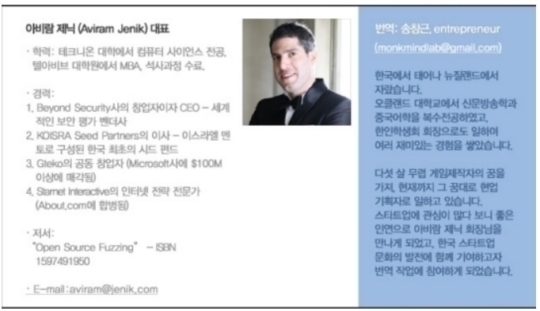비유하자면 스타트업의 `멘토링` 개념에 가까운 이러한 해석들은, 모두 유대교의 커뮤니티 리더인 랍비를 통해 제공되곤 합니다. 물론 랍비라는 직업 자체도 결국은 사람의 일이기에, 성경 해석에 대해서도 제각각 다르게 이뤄질 수 밖에 없다는 사실을 알고 있지만 말이죠. 스타트업 멘토들의 경우처럼, 모든 랍비들이 옳은 일이란 무엇인가에 대해 각기 다른 의견을 가지고 있다는 말입니다. 일반적인 유대인들이라면 조언이 필요한 때에 랍비를 찾아가 그 방법을 묻곤 합니다. 가령 안식일에도 전자담배를 필 수 있는지, 엘리베이터는 타도 되는지, 또 컴퓨터를 이용해도 되는지 식으로 말이죠. 스타트업이 멘토로부터 조언을 얻고, 이를 따라 행동으로 옮겨 사업을 성공 시키듯, 저 또한 랍비에게서 조언을 구할 수도 있습니다.
그런데 여기서 랍비를 여러 명 두게 되는 경우라면 문제가 시작되고 맙니다. 앞서 언급했듯, 랍비와 멘토도 결국엔 사람이고, 따라서 완벽한 존재라 할 수 없다는 것이죠. 다시 말해 각 랍비가 조금씩 다른 조언을 해주게 될 수도 있다는 말입니다. 어떤 랍비는 전자담배는 문제지만 엘리베이터라면 괜찮다 생각할 수 있구요, 또다른 랍비는 안식일에 사용하는 컴퓨터는 괜찮다지만, 오직 종교적인 용도일 때만 그렇다고 답할지도 모릅니다. 또 어떤 랍비는 컴퓨터는 안되는데 엘리베이터는 괜찮다고 말할 수도 있고요.
물론 멘토와 지속적으로 이야기를 나누어 온 스타트업이라면 이런 이슈에 대해 잘 알고 있을 겁니다. 모든 사람들은 모두 다른 의견을 가지고 있지요. 따라서 스타트업으로서 어떤 의견에 동조하고, 또 그렇지 않은지를 구분하는 것은 오로지 우리의 일입니다. 그런데 여기에 문제가 하나 더 존재하지요. 가령 제가 많은 랍비로부터 조언을 구하여 이들로부터 받은 조언들을 조각조각 이어붙여 제 인생을 이루도록 만들었다 하면, 결국 이러한 행위는 그 어떤 랍비로부터의 조언을 온전히 받아들이지 않고 왜곡한 결과가 되기 때문입니다. 물론 모든 랍비로부터 받은 조언을 전부 다 실행해보리라 다짐해볼 수도 있습니다. 예를 들어 랍비A에 따르면 전자담배는 괜찮다 하니 그렇게 하면서도, 엘리베이터 사용을 허락한 랍비B의 조언도 듣고, 랍비C가 컴퓨터의 사용을 허락했으니 이로서 컴퓨터 게임도 즐길 수 있게 된다는 식입니다. 조언을 받아들여 제게 주어진 모든 금기를 제거하는데는 성공하였으나, 결과적으론 종교 자체를 부정해버린 셈이죠. 사실 그것이 랍비들이 조언한 내용의 의도는 아니었을텐데 말입니다.
이는 한국 스타트업에게도 유사하게 적용되는 이야기입니다. 여러 멘토로부터 받은 조언들을 조각조각 이어붙이다보면 결국 그 스타트업이 원했던 어떤 바램 대로 쉽게 일을 해나갈 수 있게 되지요(결국 멘토들의 의도는 완전히 무시된 채로요). 저는 이를 MOS(Mentor Overflow Syndrome, 멘토 과다 현상)이라 부르고 있습니다. 보통 그들조차 의도하지 않은 상태에서 발견되는 문제곤 한데요, 가령 이런 식입니다. 한 멘토로부터 훌륭한 조언을 받게 되고, 며칠 뒤 또 다른 멘토를 만나 앞서 받은 조언과 살짝 다른 내용의 조언을 받게된 상황입니다. 이제 이 2개의 다른 조언을 하나로 합쳐 받아들이다보면 결국 두 멘토로부터의 조언에 담긴 의도는 사라지게 되면서, 여전히 당신은 멘토들의 말을 잘 따르고 있다는 기분이 들게 됩니다. 숫자를 늘려 5명, 10명의 멘토들로부터 조언을 받는 상황을 생각해보면(한국 스타트업들은 종종 멘토의 수를 늘리는 것에 대해, 올림픽으로 치면 메달을 딸 수 있는 비법 마냥 생각하는 경향이 있어 보입니다), 결국엔 그 어떤 멘토의 조언도 온전히 받아들이고 따르지 못하게된다는 결과를 맞이하게 됩니다.
유대교에서는 바로 이런 문제를 막기 위해 당신만의 랍비를 선택하도록 강요합니다. 특정 랍비에 한정되어 선택할 필요는 없다지만, 한 번 선택을 하게 되었다면 그 랍비의 조언을 무조건 따라야한다는 식이죠. 조언 중 마음에 드는 부분을 행동으로 옮기되, 마음에 들지 않는 부분일지라도 그 또한 따라야만 합니다. 그렇지 않다면 결국 랍비의 의도를 의도적으로 왜곡하게되는 셈이니깐요. 마찬가지로, 멘토로부터 조언을 받을 때에는 한 명의 멘토만 지정하여 받아보시길 바랍니다. 내게 쉬워보이는 일부분의 조언만이 아닌 조언 전체를 온전히 다 받아들여보시라는 말입니다.
이 글을 읽고 계신 당신이 만약 한국에서 스타트업을 하고 있고 글로벌 진출에 관해 도움을 받고 싶으시다면, 제가 바로 여기에 있답니다! 이 글을 개인적인 초대장이라 여기시고 연락을 주셔도 좋습니다. 저는 페이스북도 하고, 트위터(@aviramj)도 하며, 이메일 주소는 aviram@jenik.com 입니다. 제가 어떻게 도와드리면 좋을 지 알려주세요!
===
How to follow mentor advice
The Jewish religion has a concept called "Choose your Rabbi" which is very much applicable to Korean startups today.
"Choose your Rabbi" tries to help solve some inherent issues for Jews; according to Jewish tradition, the only authority on what Jews should and should not do comes from the bible (old testament). However, the bible was written thousands of years ago and requires interpretation to adapt it to current times. For example, the bible explicitly forbids Jews from lighting a fire on the Sabbath (Saturday). Clearly, that excludes smoking which involves striking a match or a lighter creating an open fire; but what about e-cigarettes? Those were not available in the period BCE and are not explicitly covered. What about turning on computers? Those have electricity which is not an actual fire but involves internal electrical sparks (even if on microscopic levels). Can we push an elevator button which triggers a mechanical motion but involves electricity? These all require interpretations.
These interpretations, the equivalent of "mentoring" in startup-speak, are provided by Rabbis, the Jewish religious leaders of the community. Rabbis, it`s clear to everyone, are humans and have their own personal interpretations of the bible. Like startup mentors, they all have different opinions on the right way to do things. Ordinary people go to their Rabbis all the time to get advice, and ask for instructions: does the bible forbid e-cigarettes on the Sabbath? Can I ride the elevator? What about computers? I can ask a Rabbi and follow their advice, the way startups seek advice from mentors and follow their advice to get to business success.
The problem starts with multiple Rabbis. As I mentioned, Rabbis (and mentors) are humans who are not perfect. Each will have slightly different advice: one Rabbi may think e-cigarettes are forbidden but elevators are ok. Others will say that computers on the Sabbath are ok for religious purposes (for example, reading and researching the bible) while others will forbid computers but allow elevators. And so on.
Any startup who regularly talks with mentors knows this: different people, no matter how smart they are, all have different opinions. It`s our job to decide which opinions we agree with and which we don`t. But here lies the problem: If I consult many Rabbis, I can probably construct a lifestyle that full conforms with fragments of advice given to me by different Rabbis but completely distorts all of the Rabbi`s intentions. For example, I can decide to do all of the above: smoke e-cigarettes because Rabbi A told me it`s ok, ride the elevator thanks to Rabbi B and play games on my computer because Rabbi C said computers are ok (for bible study) and Rabbi D said games are ok (but wasn`t explicit about how to play them). I have now removed all my restrictions but clearly abandoned my religion - that wasn`t the intention of consulted Rabbis.
Korean startups face a similar; piecing together advice fragments from multiple mentors, startups can reach any conclusion they wish and make their lives very easy (while completely ignoring the mentors` intentions). I call this MOS: Mentor Overflow Syndrome. It usually happens unintentionally: You talk to a certain mentor and get some great advice. A few days later, you meet with another mentor and get slightly different advice. You now splice those two advices together, missing the intention of both mentors, but feeling like you`re following their mentorship. Multiply this by 5 or 10 mentors (Korean startups often consider meeting mentors to be like an Olympic sport where the higher score you get the more medals you will win) and the path you are following is now only barely connected to any mentor advice.
The Jewish religion solves this by forcing you to choose your Rabbi: you`re not restricted to a particular Rabbi, but once you chose one you must stick with that Rabbi`s advice, no matter what. Implement the parts you like but you must also follow the guidance you don`t like or else you will be intentionally distorting the Rabbi`s intentions. Likewise, when receiving advice from mentors, try to stick with one mentor; if you follow advice, try to follow all of it, not just the parts that seem easy.
If you are a Korean startup that needs help going global, I want to hear from you! Consider this a personal invitation to contact me for help. I`m on Facebook, Twitter (@aviramj) and you can email me at: aviram@jenik.com to tell me how I can help you.
- Aviram

관련뉴스














